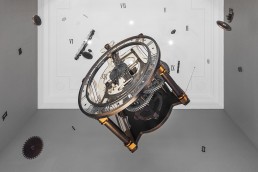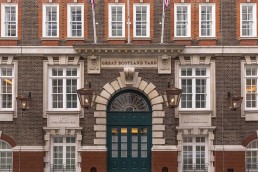Hyatt’s Unbound Collection makes its UK debut, with a narrative by EPR Architects and HBA that aims to unlock secrets of London’s past.
Once the home of the Metropolitan Police, Great Scotland Yard is synonymous with law and order. The street – a 150m throughway between Whitehall and Northumberland Avenue – was little more than a courtyard between buildings back in the 1800s, but its surroundings are steeped in history; it was here that the crimes of Britain’s most notorious villains were investigated, from the violent heists of West End gangs to the grisly murders of Jack the Ripper.
Although The Met’s original headquarters actually only backed on to Great Scotland Yard – its entrance was around the corner on Whitehall – the two became so intrinsically linked that the moniker continues to this day, despite the force vacating the site over a century ago. It’s this association that informs the identity of the street’s new resident, a 152-key hotel from Hyatt’s collection brand.
As one of a new wave of properties that champions individuality, Great Scotland Yard joins Chicago Athletic Association in Illinois, Nam Nghi in Phu Quoc and Hôtel du Louvre in Paris as a member of The Unbound Collection. Each has its own narrative, manifested in the architecture and design or the services and experiences on offer. In London, that narrative has been brought to life by EPR Architects and HBA, and with the site’s storied past, there’s certainly no shortage of tales to tell.
The hotel occupies an Edwardian building from 1910, originally built as an army recruitment office and more recently used by the Ministry of Defence. Its transformation into a hotel has been a lengthy one, taking almost a decade from start to finish. During that time there were additional planning applications to be made and a change in ownership, but with plenty of experience in converting London landmarks into luxury hotels, EPR Architects took it all in their stride. On board from the very beginning, the team were responsible for the architectural conversion of the building, restoring the façade to its former glory, defining a new internal layout and adding a rooftop extension.
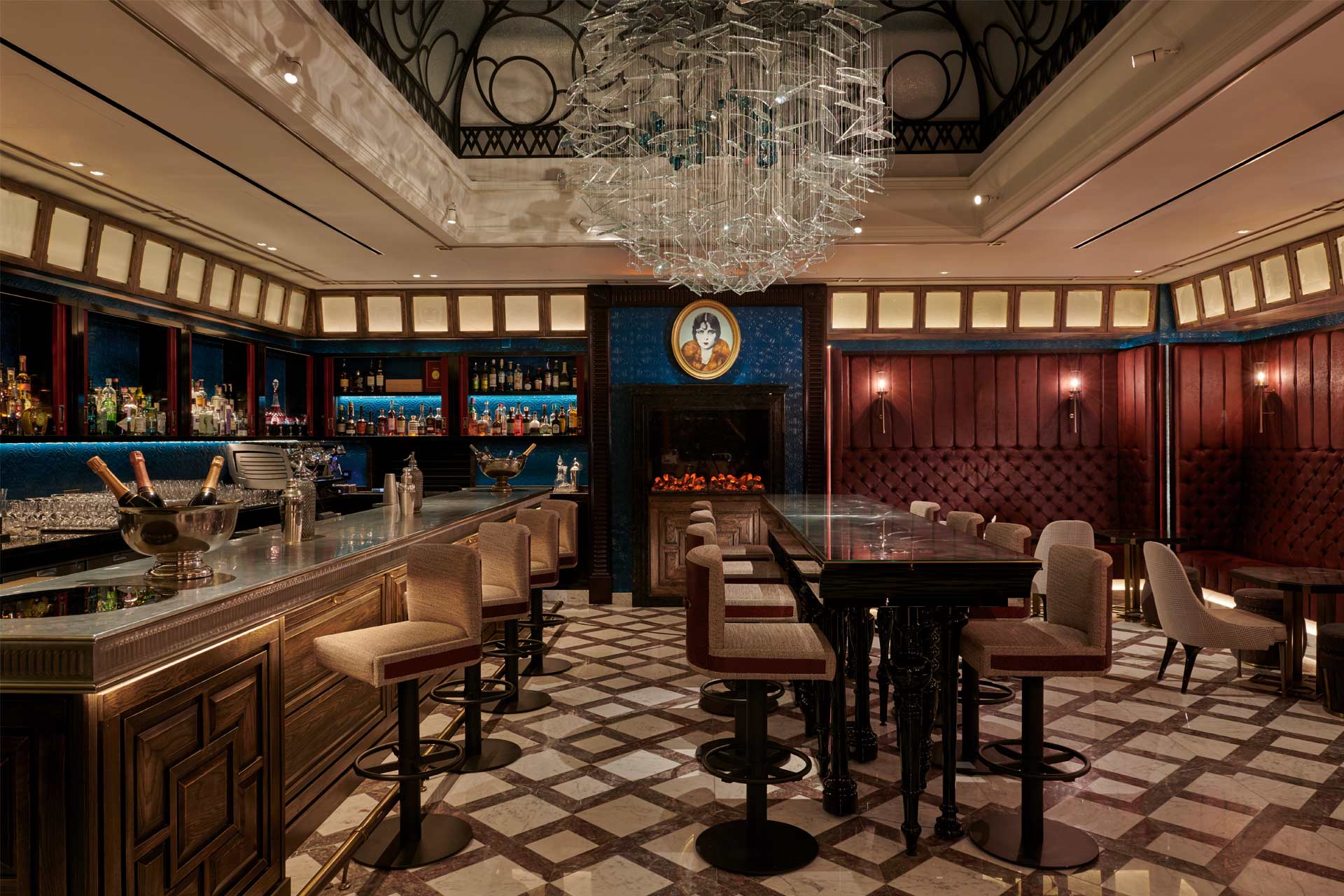
“The starting point for us was to make sure we kept the best bits,” explains EPR’s Director Nick Rayner, who took the lead on the project with Associate Director Giselle Shelton. “The character of the building really speaks for itself; it’s a fabulous example of Edwardian architecture so we were deeply invested in restoring it,” he continues, pointing out the Portland stone, glazed brickwork and sash windows, the latter of which were removed and refurbished off-site before taking pride of place alongside the trademark green doors. “When it came to extending the building, we added two storeys to the top to house extra guestrooms,” notes Rayner. “We were careful to match the stonework to the original structure and added a Westmorland slate mansard roof in keeping with the neighbours.”
Inside, the building was stripped back to its structural shell, with excavation two levels down to make way for a gym, co-working space and back-of-house. Plenty of thought has gone into the layout of the ground floor too, with a welcoming lounge greeting guests on arrival, and check-in discreetly tucked away around the corner. For the F&B spaces, EPR could simply have borrowed from its earlier works – the scale of Kimpton Fitzroy for example, or the multi-venue dining room at The Ned – but Great Scotland Yard called for a different approach altogether. “Part of our role was to make the layouts work, to create that bespoke feel,” explains Shelton. “We wanted the public areas to be approachable and feel comfortable, so rather than a large, open-plan space, we’ve divided it up into a series of smaller, more intimate zones, each with a different offer.”
It’s worth noting that these decisions were made before the operator was in place, which could have proved disastrous should certain bids have been successful. “We designed the building in a way that would suit a number of different brands,” says Rayner. “However any interest from operators with a rigid brand concept fell away very quickly due to the nature of the project. The building and ground floor spaces really demanded something like The Unbound Collection to be able to embrace the unique character.”
In 2016, part-way through construction, Great Scotland Yard changed ownership, with Twenty14 Holdings – the hospitality investment arm of Abu Dhabi-based Lulu Group International – stepping in with fresh investment. Various brands were rumoured to have shown interest but it was Hyatt that triumphed, bringing The Unbound Collection to the UK for the first time. For the interiors, Twenty14 appointed HBA, with David T’Kint, Partner of the newly-formed EMEA studio taking the lead. “We were challenged to keep the soul of the building and pay homage to its heritage rather than just bringing new life to old walls,” he explains. “Our design team created a destination that invites guests to experience the rich history of the building through new eyes as they enter a place where the past and present merge, to journey through various aspects of local culture, unlocking the secrets of the storied Great Scotland Yard along the way.”
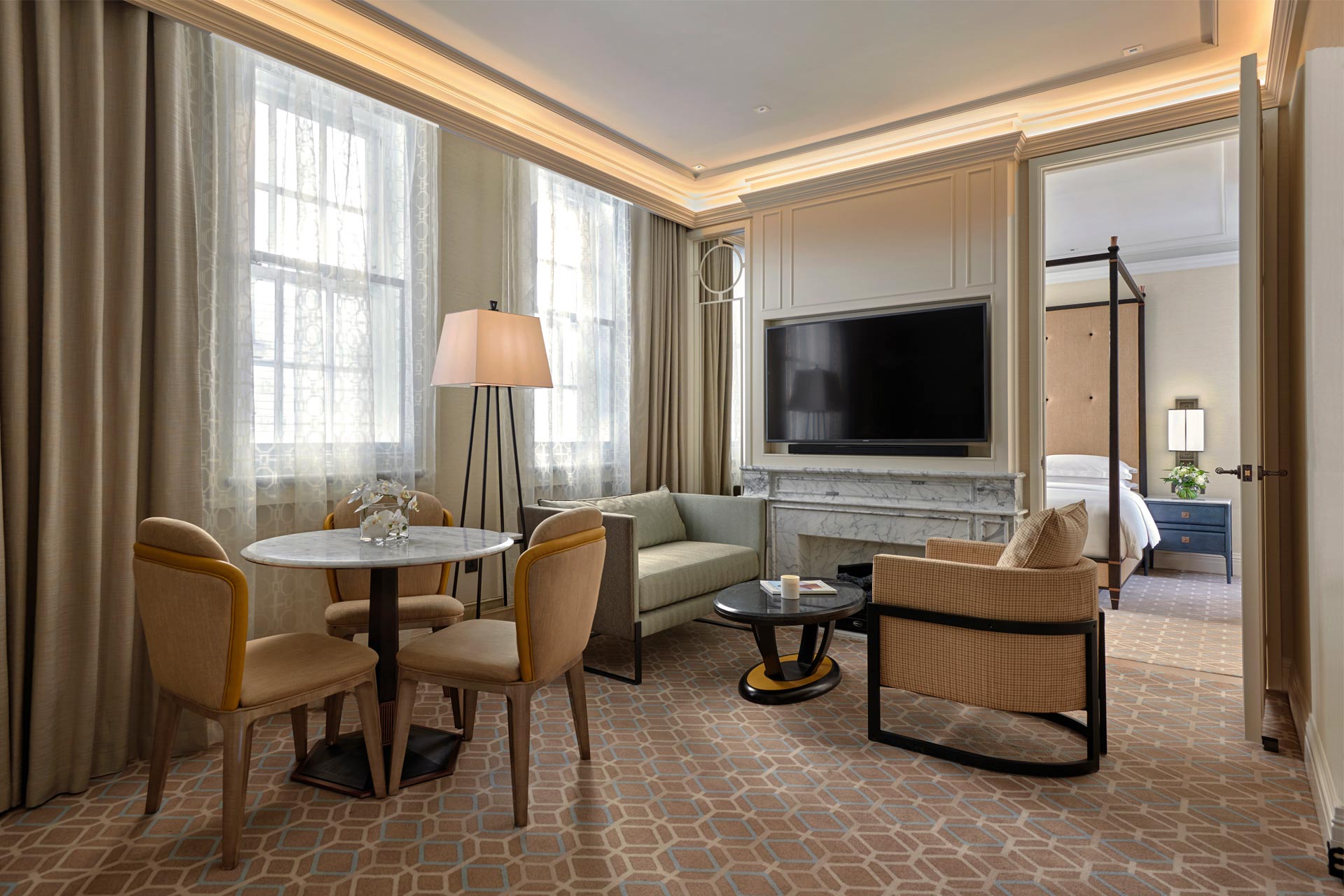
The anecdotes begin in the entrance hall, where a 450kg clock crafted from glass and stainless steel hangs overhead. Made by Preciosa, the installation shows the inner mechanisms of the clock and the perpetual time of 6pm – tea time in Alice’s Adventures in Wonderland. If you’re wondering about the connection to Great Scotland Yard, the book’s author, Lewis Carroll, was hauled in for questioning by the detective unit that once occupied this site, as a suspect in the hunt for Jack the Ripper.
The crime theme continues in the lobby lounge, where an artwork by Nicola Green – part of a 600-strong collection curated by Hollandridge Group – features mugshots of characters associated with the area, from gangsters and criminals to prominent judges and police personnel. Elsewhere, an installation by prison charity Koestler Arts showcases the works of serving offenders; a cabinet of memorabilia displays police helmets through the ages; and paintings by Brazilian artist Julio Alan Lepez bring a touch of humour to quintessential British icons.
At the heart of the hotel, The Forty Elephants tells the story of an all-female crime syndicate known for its skill in dodging police detention. Set beneath a central lightwell, the cocktail bar features a chandelier of broken glass, designed by Lasvit to represent the smash-and-grab crimes of the gang, while a stylised portrait of The Bob Haired Bandit – aka accomplice Lillian Rose Goldstein – hangs over the fireplace.
Sibin meanwhile is a secret whisky bar concealed behind a door disguised as bookshelves; the kind of place you might expect illicit whisperings over a single malt. Whisky-filled display cabinets divide the space into three seating areas, while a rich palette of distressed timber flooring, oak panelling and copper detail creates a speakeasy feel to accompany a ceiling installation of 1,935 glass bottles.
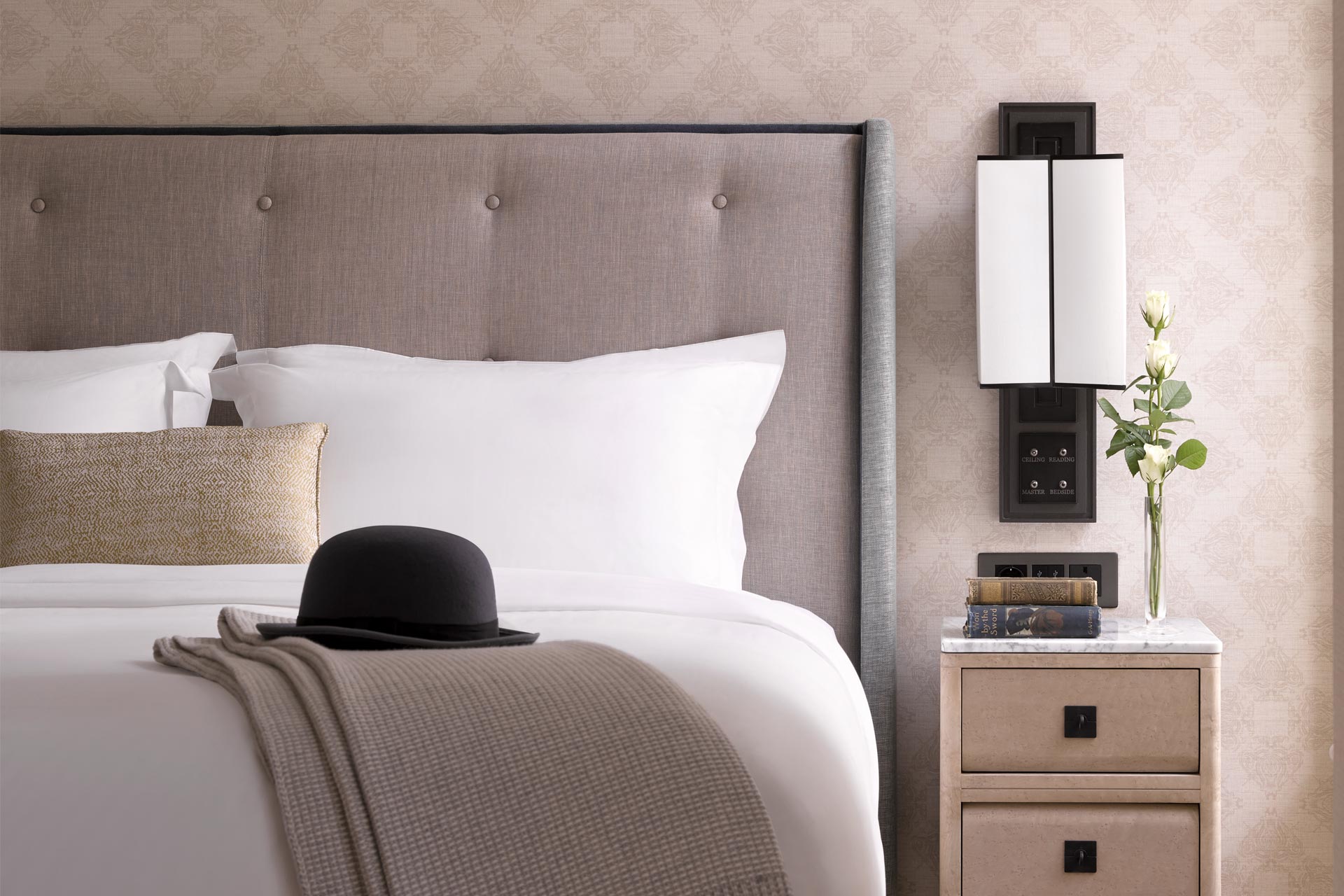
“The building has such a rich and colourful history; it was imperative that we capture its legacy and heritage,” says T’Kint of the eclectic series of spaces that make up the food and beverage offer. “Our inspiration came from the architecture and location; the area has hosted so many important ‘guests’ so their stories were woven into the design too.”
In a departure from the law and order theme, The Parlour draws on Britain’s explorative past and transports guests to the West Indies with tropical prints and wicker furniture, while The Yard – curated by chef Robin Gill – is reminiscent of a country escape. Vaulted ceilings and exposed brickwork set the scene for a changing menu of modern British fare, devised around local micro-farmers and their produce.
Guestrooms come in a variety of shapes and sizes, adding to the bespoke feel of the hotel – corner rooms and those up in the eaves are particularly special – and there’s also a five-storey Georgian townhouse next door that serves as a standalone suite. Interiors follow a pared back scheme with a neutral colour palette and high-quality materials, though on closer inspection there’s subtle touches that reference the history of the building and its surroundings; nightstands are finished in a shade of blue veneer synonymous with the British police force; wardrobes are concealed behind a false bookcase in a nod to the MOD library that was once located here; robe hooks are shaped as keys; and artworks see the iconic police helmet transformed into a graphic pattern and embellished with gold leaf.
The narrative touches every aspect of the property from the logo to the uniforms – a sophisticated take on the jailbird stripe; in fact Great Scotland Yard has enough stories to fill an entire book. For those who’ve worked on the project, there’s a palpable sense of pride, one that’s shared by the owners, who had close involvement in the final product and a passion for creating a hotel that relates to its locale. It’s fair to say they’ve succeeded.
EXPRESS CHECK-OUT
Owner: Twenty14 Holdings
Developer: Galliard
Operator: Hyatt
Architecture: EPR Architects
Interior Design: HBA
Brand Strategy: Brash
Graphic Design: Imaginateur
Lighting Design: Illuminate, LEDFlex
Uniform Design: Studio 104
Art Consultant: Hollandridge Group
F&B Consultant: Gorgeous Group
www.hyatt.com
CREDITS
Words: Catherine Martin
Photography: Courtesy of Hyatt
Magazine: Sleeper 89
Related Posts
12 March 2020
Preciosa halts time at Great Scotland Yard
30 January 2020
